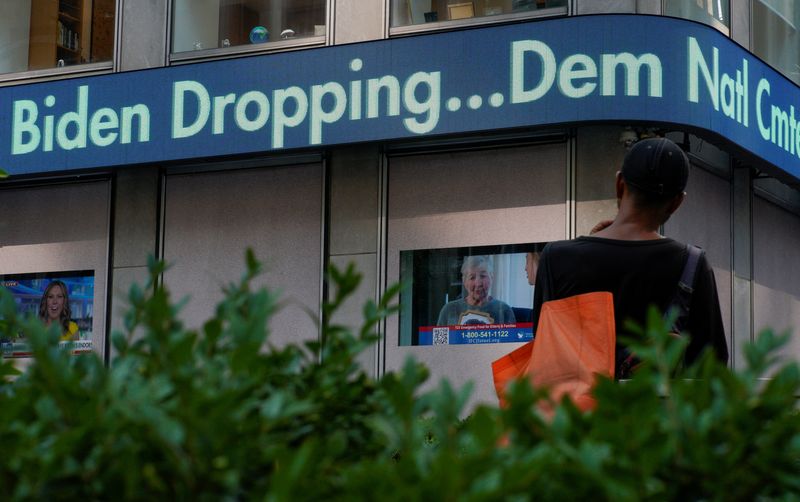Select Language

(Fixes typo in paragraph 2)
By Noel Randewich
(Reuters) -A look at the day ahead in Asian markets by Noel Randewich.
Markets face a new U.S. electoral calculus after U.S. President Joe Biden's abrupt announcement Sunday that he will end his campaign against former President Donald Trump for reelection.
Friday's global cyber disruption was a factor in the S&P 500 and Nasdaq posting their worst weeks since April. It was not obvious before exactly what the "Trump trade" was or its overall impact given the focus on Fed policy and other variables. But now investors everywhere will scramble to figure out how to play the sudden uncertainty.
Investors may still be licking their wounds as Asian financial markets gear up after a week that saw worries about Taiwan, global trade and semiconductors rattle tech stocks and ripple across other sectors.
The health of the world's second largest economy is in focus after a key Communist Party meeting last week did little to stoke optimism, and as expectations solidify that Trump will return to the White House.
Pressure for deep changes in how the China's economy functions has risen this year, with consumer and business sentiment near record lows domestically.
China's export dominance has been accentuated by solidifying expectations Trump will win the November U.S. presidential election after the former president formally accepted the Republican Party's nomination.
Asia financial markets open after a dismal week for global stocks that saw MSCI's global index suffer its worst week since April, in large part over worries about trade disruptions, including additional restrictions by Washington on semiconductor sales to China.While Biden endorsed Vice President Kamala Harris to replace him at the top of the Democrat's ticket, it's not yet clear who the party will select. On politics betting website PredictIt, contracts for Harris being the candidate are priced at 83 cents. Contracts for a Trump victory over Harris at the polls are trading at 61 cents, with a potential $1 payout.
Trump has suggested he would impose tariffs of 60% or higher on all Chinese goods, and his choice of populist Ohio Senator J.D. Vance as his running mate provides fresh evidence of what would be a tough U.S. stance on China.
Taiwan must rely on itself for defense given the threat it faces from China, Foreign Minister Lin Chia-lung said on Friday, responding to criticism from Trump that sent global chip stocks skidding on Wednesday.
In Japan, core inflation accelerated for a second straight month in June, data showed on Friday, extending a more than two-year run above the central bank's 2% target. That kept alive market expectations of a near-term interest rate hike, although most economists expect the Bank of Japan (BOJ) to hold off on raising rates at its July 30-31 policy meeting as soft consumption weighs on a fragile economy.
Dollar/yen hardly moved on Friday, wrapping up U.S. trade at 157.50. The BOJ is also wrestling with a weak yen that has crippled households by making food and fuel more expensive. Currency traders will be closely watching the yen after several suspected interventions by the country's central bank to prop it up already this month.
Here are key developments that could provide more direction to Asian markets:
- China's 1-year loan prime rate (July)
- Singapore CPI (June)
- Taiwan export orders (June)
- New Zealand trade balance (June)

